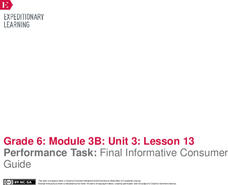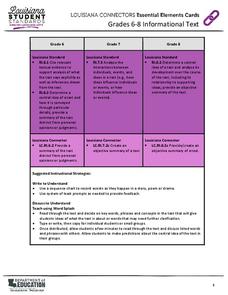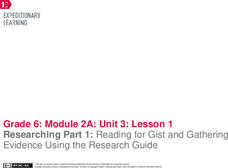EngageNY
Gathering Information about Water Management: Assessing and Reading Internet Sources, Day 3
Water is life! Using the informative resource, scholars first read two informational articles about water management in agriculture. Then, they use a Venn diagram to contrast the different types of evidence authors use to support a...
EngageNY
Mid-Unit Assessment: Analyzing an Author’s Argument and Text Structure
William Shakespeare: a writer, a poet, a fake? For their mid-unit assessments, scholars read an excerpt from the article "The Top Ten Reasons Shakespeare Did Not Write Shakespeare" by Keir Cutler. Next, they analyze the author's argument...
EngageNY
Finding Relevant Information and Asking Research Questions: The Big Thirst
Let's get to the gist. As scholars continue their study of Charles Fishman's The Big Thirst, they practice writing the gist of the text. Additionally, pupils add notes about the industrial uses of water to their researcher's notebooks.
EngageNY
Research: Close Read of Text 3 for Each Expert Group
How do athletes break barriers? Pupils consider the question as they continue looking for evidence to support their opinions about how their chosen athlete created a legacy. In small groups, they read an informative article about either...
EngageNY
Researching Information about Sustainable Fishing
Go fish! Scholars continue using their research skills to find factual information to use in their consumer brochures about overfishing. They work in triads to research information about sustainable fishing practices and share their...
EngageNY
Analyzing the Features of an Informative Consumer Guide
Analyze, strategize, synthesize! Scholars analyze informative consumer guides to determine what features to include in their own guides. Next, pupils select charts and images to use in their guides.
EngageNY
Planning Content of Informative Consumer Guide: Sustainable Fishing Methods
There's no such thing as over-planning. In preparation for their informative consumer guides, scholars complete a Quote Sandwich graphic organizer to compile their information about sustainable fishing methods. Next, volunteers share...
EngageNY
Planning Content of Informative Consumer Guide: The Issue of Overfishing and Fish Depletion
Let's get organized! Pupils organize the information they have gathered about overfishing into a Quote Sandwich graphic organizer in preparation for their informative consumer guides. Next, they engage in a pair share activity to discuss...
EngageNY
Performance Task: Final Informative Consumer Guide
Formative feedback should be kind, specific, and helpful. Pupils engage in a peer editing process, using a rubric to critique a partner's writing. Next, scholars use the feedback to create the final version of their informative consumer...
EngageNY
Mid-Unit 3 Assessment Part 1: Researching Information about Buying Fish Caught Using Sustainable Methods
Sustainable seafood is not an oxymoron. Pupils watch a video about how consumers purchase seafood responsibly. Then, using resources in their assessment research folders, they complete a graphic organizer to record factual information...
Curated OER
Word Up!
Study the importance of word choice in informational text. Middle and high schoolers locate unfamiliar words and phrases in newspaper articles of their choosing, and use online word sites to explore the definitions and histories of each....
Curated OER
Active Reading with American History
Explore connections within and between informational texts with this lesson about encyclopedia articles. Middle schoolers write encyclopedia articles focusing on topics in American history. They discuss how to determine credibility...
Curated OER
Who Could Have Been Who
Can word choice affect a candidate's likeability? Use a New York Times lesson to explore how a presidential candidate's likeability factor can fluctuate in public opinion polls. Young readers choose a presidential election from their...
Lerner Publishing
Meet the Dinosaurs
Take your class of youngsters on a prehistoric adventure with this four-lesson series on dinosaurs. Accompanying the Meet the Dinosaurs books by Don Lessem, these lessons engage children in writing their own dinosaur books, making...
EngageNY
Taking Notes and Citing Quotes from Text: Gathering Information on our Rainforest Insects
In other words. Scholars practice using paraphrasing and quotes. They partner in pairs to write a paraphrase for an information text strip. Individuals then use their skills to paraphrase information from the text Fire Ants.
Louisiana Department of Education
Essential Elements Cards
Use essential elements cards to help lesson plan! Each card contains an informational text common core standard for grade levels six through eight and suggestions for activities and supports. Cards address skills such as citing textual...
EngageNY
Researching Part 1: Reading for Gist and Gathering Evidence Using the Research Guide
If only life came with an owner's manual. Pupils assemble with their research teams to discuss which of Steve Jobs' rules to live by most resonates with them. Scholars also read informational texts in pursuit of finding the gist and...
Curated OER
Butterfly, Butterfly: Teaching Vocabulary
Kindergarteners practice new words through listening to and reading the science book Butterfly by Jenny Feely. The teacher will first choose words that are essential for understanding the text. Then, using pictures in the text, pupils...
Curated OER
Where the Books Are
The news is full of interesting stories and ideas shared in an informational style. Readers use the provided who, what, when, where, and why questions as they explore an article about a man who is passionate about archiving physical...
Curated OER
Reading about Recent Exhibits in the Art and Design Section
A large part of analyzing or understanding art is knowing how to read about it. The New York Times has put together these who, what, where, when, and how questions to aid learners in comprehending informational pieces related to art and...
Curated OER
Monster Plants Storia Teaching Guide
Who wouldn't want to read a book about monster plants? Get those kids into informational texts with an engaging topic, like meat eating plants! You'll use the teaching guide to provide structured practice as your class reads to...
EngageNY
End of Unit 2 Assessment: Working with Two Texts - Reading, Listening, Summarizing, and Synthesizing
As a summative assessment for this unit on colonial trade, fourth graders listen to and read informational texts in order to demonstrate their ability to take notes, write summaries, and draw connections. Young scholars first listen as...
EngageNY
Main Ideas in Informational Text: Analyzing a Firsthand Human Rights Account for Connections to Specific Articles of the UDHR
Lesson 10 in a series of human rights lessons focuses on the skills of finding evidence and summarizing. Your young readers work to compare the two texts they have read in this unit: the Universal Declaration of Human Rights...
EngageNY
Main Ideas in Informational Text: Analyzing a Firsthand Human Rights Account
Although this is part of a series, lesson plan nine has your class take a break from their close study of the Universal Declaration of Human Rights (UDHR) text to read the firsthand account “Teaching Nepalis to Read, Plant, and Vote” by...

























